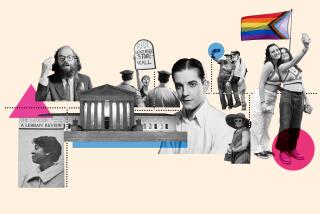Opinion: Need inspiration to fight Trump? Look to Bayard Rustin, the man who organized MLK’s March on Washington
- Share via
On Aug. 28, 1963, more than 200,000 men and women flooded the National Mall in Washington to hear Martin Luther King Jr. confront America’s violent history of slavery and racism. Part of the historic March on Washington for Jobs and Freedom, King’s ensuing “I Have a Dream” speech in front of the Lincoln Memorial helped coalesce a movement of nonviolent civil rights activists, labor, and religious organizations. In the face of tremendous political and cultural opposition, this coalition eventually helped pass the 1964 Civil Rights Act and the Voting Rights Act of 1965.
In the wake of Donald Trump’s ascension to the presidency, many Americans — people of color, immigrants, women, the disabled and LGBT people — now face the threat of new policies that will disenfranchise and marginalize us. A generation of youth who came of age under the Obama administration with a sense of security about their protections under the law are now, for the first time, in danger of seeing their rights rolled backward.
The current generation of activists is now tasked with weaving together a fragmented coalition of communities to fight rollbacks on an array of social justice and human rights issues — from police brutality and reproductive rights to global warming and marriage equality. As Dr. King said in his speech, “We cannot walk alone.”
Despite his prominence and his gift for organizing, Rustin was marginalized as an outsider because of his sexuality.
The recent Women’s March on Washington was surrounded by discussion about the need for “intersectionality” in this new political moment — the idea being that when disparate identities converge into a larger battle against injustice, their power is magnified. Long before this notion existed, however, an often overlooked figure from the civil rights movement lived it. He was Bayard Rustin, the organizer of King’s original March on Washington — and his pragmatic, multi-pronged approach to the fight for social justice is instructive in light of the current struggle.
In the early 1960s before the rise of the women’s movement or the Stonewall Rebellion, Rustin, a gay African American man, was a leading strategist in the burgeoning civil rights movement. He brought the idea of nonviolence to the movement from his encounters with the followers of Mahatma Gandhi.
But despite his prominence and his gift for organizing, Rustin was marginalized as an outsider because of his sexuality. He was called a “pervert” by his political opponents and by some allies as well. He averted controversy by working behind the scenes as an important advisor to activists like King.
Denied the opportunity to fight publicly, Rustin stepped back from the forefront of the civil rights movement for the greater good. And yet he didn’t allow the roadblocks of his era to halt a multidimensional pursuit of justice — even if those roadblocks, at the time, seemed insurmountable.
In the early 1980s, facing formidable anti-LGBT discrimination, Rustin adopted his younger boyfriend Walter Naegle to obtain the same legal protections as marriage. Rustin was 37 years older than his partner, and at the age of sixty-five, he wanted to protect Naegle in case something were to happen.
When Rustin read about a couple who adopted each other for legal rights, he asked his lawyer to help him do the same. The first step was for Naegle to ask his mother to disown him. She agreed because she was supportive of Naegle and Rustin’s long-term relationship. After filing an application with the Department of Child Welfare, a social worker visited Rustin and Naegle’s home as if Rustin was adopting a small child. She understood the nature of their relationship and confirmed that they lived in a “fit home.” Several years later their adoption was approved by a judge.
Naegle and Rustin became a legally bound couple.
At a time when gay marriage was inconceivable, many other gay couples also found legal protection through adoption. This solution became even more urgent as the AIDS epidemic took hold and same-sex partners were denied hospital visitation or the rights to inherit a deceased partner’s estate.
Rustin’s ingenuity in this private act of defiance shows a surprising line of continuity between the civil rights movement and the struggle for LGBT rights. During the Jim Crow era the notion of a grass-roots movement bringing about federal legislation that outlaws discrimination was inconceivable. It was radical for nonviolent protesters to confront the police who sprayed them with fire hoses and unleashed attack dogs.
Many would consider intergenerational gay adoption to be a radical choice, but it was a resourceful solution to obtain essential rights. Today gay marriage is part of the mainstream. History has shown that what is considered radical for one generation can become an accepted institution for another.
In the wake of the current mass protest movement, the onus now falls on a new generation of activists to take radical steps to protect many of the rights we have come to expect. While taking to the streets is essential, it is also important to remember that creative resistance like Rustin’s — even in the face of seemingly overwhelming opposition — can lead to the mainstreaming of equal rights. Radicalism demands unusual creativity, and it unfolds both in passionate acts of public protest and behind closed doors.
Matt Wolf is a documentary filmmaker. His latest film, “Bayard & Me,” recently premiered at the Sundance Film Festival.
Follow the Opinion section on Twitter @latimesopinion and Facebook
More to Read
A cure for the common opinion
Get thought-provoking perspectives with our weekly newsletter.
You may occasionally receive promotional content from the Los Angeles Times.










